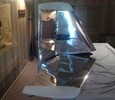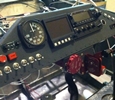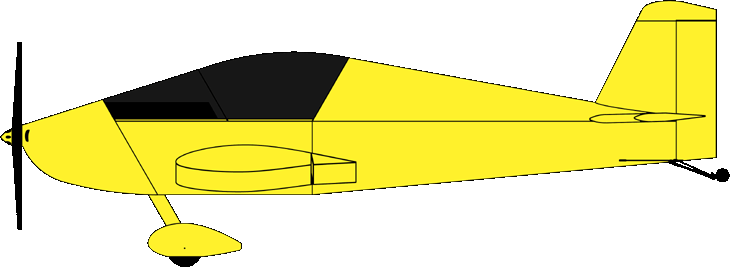


random user submitted photo
EMPI Full-Flow High Volume Oil Pump and Filter unit
22 posts
• Page 1 of 3 • 1, 2, 3
EMPI Full-Flow High Volume Oil Pump and Filter unit
Hi Guys and Gals,
New to the forum, however I am getting to know my Aerovee engine which was fitted to the Onex I recently brought. Looking at the oil-pump fitted to the engine, it has 26mm oil pump gears, which I assume is a standard size to Sonex?
I am looking to fit an oil filter but want to avoid unnecessary connectors and pipes with a piped external filter, which introduces possible failure points. I hear that the all-in-one EMPI style pump/filters dont give as good as flow as the remote style by-pass systems that often requires the case being drilled, however the higher capacity 30 mm units should help overcome any real reduction of flow rates with a standard size pump.
Has anyone out there fitted a 30mm gear high-volume EMPI style all-in-one adaptor to their engine and have you had any observed issues with it? Indeed, is there room to fit one in behind a Onex cowling?
BTW, I am aware of the mini-sump kits, but do not like the idea of "drawing" oil through a filter....
Regards,
HH
New to the forum, however I am getting to know my Aerovee engine which was fitted to the Onex I recently brought. Looking at the oil-pump fitted to the engine, it has 26mm oil pump gears, which I assume is a standard size to Sonex?
I am looking to fit an oil filter but want to avoid unnecessary connectors and pipes with a piped external filter, which introduces possible failure points. I hear that the all-in-one EMPI style pump/filters dont give as good as flow as the remote style by-pass systems that often requires the case being drilled, however the higher capacity 30 mm units should help overcome any real reduction of flow rates with a standard size pump.
Has anyone out there fitted a 30mm gear high-volume EMPI style all-in-one adaptor to their engine and have you had any observed issues with it? Indeed, is there room to fit one in behind a Onex cowling?
BTW, I am aware of the mini-sump kits, but do not like the idea of "drawing" oil through a filter....
Regards,
HH
- Attachments
-
- Filter.jpg (22.37 KiB) Viewed 5993 times
- Hap Hazard
- Posts: 18
- Joined: Mon Dec 13, 2021 1:47 am
Re: EMPI Full-Flow High Volume Oil Pump and Filter unit
I did have one on my first Waiex, and will have it again on my next.
I did have to cut a relief in the front of the cowl. At this time, I don't remember the part number, but there is a shorter filter that doesn't take up as much space. Didn't form a blister over it. Just let the filter, more or less, plug the hole. It also has the benefit of acting as an oil cooler. I had to block off a portion of the top mounted cooler to get the temp up.
I also had the mini sump. Not for the filter, but to increase the oil capacity. Just leave out the filter and make sure the pick-up goes lower.
I did have to cut a relief in the front of the cowl. At this time, I don't remember the part number, but there is a shorter filter that doesn't take up as much space. Didn't form a blister over it. Just let the filter, more or less, plug the hole. It also has the benefit of acting as an oil cooler. I had to block off a portion of the top mounted cooler to get the temp up.
I also had the mini sump. Not for the filter, but to increase the oil capacity. Just leave out the filter and make sure the pick-up goes lower.
- Area 51%
- Posts: 804
- Joined: Thu Feb 18, 2016 7:57 am
Re: EMPI Full-Flow High Volume Oil Pump and Filter unit
I had a remote filter and removed it. Saved 2.5 lbs. Also eliminated issues with the filter blowing out on startup when the oil is cold. I would think carefully before you add something you don't really need. Also regarding adding flow with a 30mm pump - why?
There is no way that would fit behind my Waiex cowl.
There is no way that would fit behind my Waiex cowl.
Bryan Cotton
Poplar Grove, IL C77
Waiex 191 N191YX
Taildragger, Aerovee, acro ailerons
dual sticks with sport trainer controls
Prebuilt spars and machined angle kit
Year 2 flying and approaching 200 hours December 23
Poplar Grove, IL C77
Waiex 191 N191YX
Taildragger, Aerovee, acro ailerons
dual sticks with sport trainer controls
Prebuilt spars and machined angle kit
Year 2 flying and approaching 200 hours December 23
-

Bryan Cotton - Posts: 5489
- Joined: Mon Jul 01, 2013 9:54 pm
- Location: C77
Re: EMPI Full-Flow High Volume Oil Pump and Filter unit
Hap Hazard wrote:Hi Guys and Gals,
New to the forum, however I am getting to know my Aerovee engine which was fitted to the Onex I recently brought. Looking at the oil-pump fitted to the engine, it has 26mm oil pump gears, which I assume is a standard size to Sonex?
I am looking to fit an oil filter but want to avoid unnecessary connectors and pipes with a piped external filter, which introduces possible failure points. I hear that the all-in-one EMPI style pump/filters dont give as good as flow as the remote style by-pass systems that often requires the case being drilled, however the higher capacity 30 mm units should help overcome any real reduction of flow rates with a standard size pump.
Has anyone out there fitted a 30mm gear high-volume EMPI style all-in-one adaptor to their engine and have you had any observed issues with it? Indeed, is there room to fit one in behind a Onex cowling?
BTW, I am aware of the mini-sump kits, but do not like the idea of "drawing" oil through a filter....
Regards,
HH
I don't think it'll fit under the cowl. Aerovee has a parts list for a remote oil filter for rhe Turbo. You might be able to adapt that for a standard Aerovee if you are so inclined.
Plenty of certified aircraft engines operate without modern day filtration. The oil change intervals are less to reflect that. Aerovee is 25 hours, so I believe that's why they don't bother with the added complexity of a filter. It became a requirement for a filter on the turbo due to fine particulate siezing the shift bearing.
Chris Morris
Sonex N998PC - SOLD!
Sonex #1732 - Aerovee Turbo
Central Florida
Sonex N998PC - SOLD!
Sonex #1732 - Aerovee Turbo
Central Florida
-

tps8903 - Posts: 134
- Joined: Mon Dec 17, 2012 4:33 pm
Re: EMPI Full-Flow High Volume Oil Pump and Filter unit
My teacher ("Veeduber") did not like them.
The stock oil pump has cast iron body and a cast iron cover. They NEVER wear out. Whatever (minor) thrust the oil pump gears exert gets reacted across the whole face of both gears on the IRON pump cover.
Full flow the case, and you have cut a hole in this reaction surface on the pump cover to let the oil out to go to a filter and/or a cooler. Plus, MOST full flow pump covers are pot metal. Less surface area, and a softer substrate => the pump cover wears out.
The pump/filters compound this; there are TWO holes on the surface the pump gears bear on now, and still the pump cover is pot metal.
If you want a filter, Gene Berg sells STEEL pump covers with oil outlets. You can even get them with relief valves so that if the oil is cold and/or the oil relief piston sticks in it's bore, it won't blow up the "stock" filter. There is plenty of room on the engine mount to hang a remote filter mount. https://photos.app.goo.gl/vstt1LXFRFL1vFvP6 Ivan Schultz's AeroVee installation. Notice the FRAM HP filter - no relief on his pump cover. I'd use a shorter HP18, me, but I'm running my AeroVee without a filter right now TO GET THIS AIRPLANE FLYING!
The stock oil pump has cast iron body and a cast iron cover. They NEVER wear out. Whatever (minor) thrust the oil pump gears exert gets reacted across the whole face of both gears on the IRON pump cover.
Full flow the case, and you have cut a hole in this reaction surface on the pump cover to let the oil out to go to a filter and/or a cooler. Plus, MOST full flow pump covers are pot metal. Less surface area, and a softer substrate => the pump cover wears out.
The pump/filters compound this; there are TWO holes on the surface the pump gears bear on now, and still the pump cover is pot metal.
If you want a filter, Gene Berg sells STEEL pump covers with oil outlets. You can even get them with relief valves so that if the oil is cold and/or the oil relief piston sticks in it's bore, it won't blow up the "stock" filter. There is plenty of room on the engine mount to hang a remote filter mount. https://photos.app.goo.gl/vstt1LXFRFL1vFvP6 Ivan Schultz's AeroVee installation. Notice the FRAM HP filter - no relief on his pump cover. I'd use a shorter HP18, me, but I'm running my AeroVee without a filter right now TO GET THIS AIRPLANE FLYING!
- karmarepair
- Posts: 193
- Joined: Sun Oct 11, 2020 8:13 pm
Re: EMPI Full-Flow High Volume Oil Pump and Filter unit
karmarepair wrote:The stock oil pump has cast iron body and a cast iron cover.
Actually, it's a stamped steel cover. But point taken.
You will find more damage to the pump gears, resulting in a potential drop in pressure, due to incoming debris from the suction side than can be expected from pump cover wear. Enter the filter in the Mini-Sump. (Works very well with hot oil.) .
However, it would be hard to find a better lubricated component inside an engine than the oil pump. Add to that the fact there are multiple soft-to-hard interactions within an engine (bearings-to-crankshaft springs to mind) and the longevity of an oil pump cover seems trivial. Change it at teardown if it makes you nervous.
I have had one of these pump/filter assemblies on my buggy for 10 years and 85k miles. I check it every other year and so far you can barely feel a step where the pump gears ride. It takes a sensitive fingernail indeed. The "wear" pattern on the unit I had installed on my Aeroveeish of 80hrs indicates it too would have had no problem making the run to overhaul.
My recommendation is to use whatever helps you sleep at night. .
- Area 51%
- Posts: 804
- Joined: Thu Feb 18, 2016 7:57 am
Re: EMPI Full-Flow High Volume Oil Pump and Filter unit
Area 51% wrote:My recommendation is to use whatever helps you sleep at night.
That's a keeper!
I do have a Gene Berg pressure relief valve cover. I figured since I removed the weak link of the filter seal, the oil cooler would be the next fuse in the system. I'd really like to remake the cover out of aluminum. It's heavy.
Bryan Cotton
Poplar Grove, IL C77
Waiex 191 N191YX
Taildragger, Aerovee, acro ailerons
dual sticks with sport trainer controls
Prebuilt spars and machined angle kit
Year 2 flying and approaching 200 hours December 23
Poplar Grove, IL C77
Waiex 191 N191YX
Taildragger, Aerovee, acro ailerons
dual sticks with sport trainer controls
Prebuilt spars and machined angle kit
Year 2 flying and approaching 200 hours December 23
-

Bryan Cotton - Posts: 5489
- Joined: Mon Jul 01, 2013 9:54 pm
- Location: C77
Re: EMPI Full-Flow High Volume Oil Pump and Filter unit
Thanks guys for the answers to date. Pretty predictable spread out there on opinion, either side of the argument (depending on your view of course).
Firstly, my opinion is exactly that, (like yours) my opinion and I am obviously not an automotive design engineer, nor do I believe I know more than the guys at Sonex....
Firstly Karmarepair, thanks for the reply which introduces something that I hadnt really thought too much about in terms of wear. Most of the aftermarket pump covers I have seen on suppliers website are aluminium, so excessive wear is obviously not an immediate issue, or there would be a lot of comment all over the NET to steer away from them. Of course, an aluminium cover doesnt preclude the use of them per'se, oil pressure gauges give us a dynamic indication of oil pressure, so as the cover plate wear issues will no doubt result in less oil pressure. Ironically, I think particles suspended in the oil will probably cause more scratching/grooving and accelerated wear in the plates, so decent filtered oil becomes another good reason as to why you might want to consider filtering your oil! It is, nevertheless, a valid point that needs thinking about, so thank you for that.
What is more important to me as far as your post is concerned is the fact you can get pressure-relief cover plates. Reading up some more on these however, they sound like they dump oil back to the suction side of the pump(?). There are quite a few warnings out there that the relief valves have a tendency to stick and come with an engine health warning, so clearly they look like that they have their issues too and you run some pretty potentially high risks to your motor if this happens...so clearly more homework needed by ‘yours truly’ before I consider this route.
tps8903
Ok, in answer to your perfectly sound logic about VW Engineers...yes they knew their beans for the technology of the day, certainly without doubt, light-years beyond me. However, it is an old design, really old, as is many other aircraft motors out there that you mention, most of which were also designed in the 1930's. During the 60's and 70's there were some in-depth studies into the benefits of filtration and the results were clear. Since the lessons of those studies, ALL engines today are designed with far better oil filtration, with the proof of the VW pudding being that the Boffins at VW decided that the Type 4 was to have an oil filter fitted as standard.
So the longer term benefits are clear on that score (I have a conversion kit on my soon to be supercharged 1934 MG OHV engine, which also relied on a wire gauze filter). Neither am I questioning John Monnett's wisdom, but the fact he offers after-market kits in the form of the Maxi sump filter units, in itself means they consider it important enough to at least offer the option (my engine came with a brand-new Maxi-sump filter kit BTW, so that's an option open to me too). If that wasn’t enough, Revmaster (who IMHO made a more refined engineered engine) fitted their own proprietary high-volume oil pump bypass filter system, so again, another endorsement to giving the issue (on more than one level) very serious consideration, which in my opinion, backs up the fact that if you want to get the best out of an engine in terms of long-term reliability, then effective oil filtration is a no-brainer.
Also in answer to your other point…I think you have a typo, but I think I know what youre driving at…. If you are running the engine without an effective particulate oil filter, oil changes need to be MORE regular (not LESS as you state) if you want to ensure that levels of contamination remain as low as possible. No doubt that’s the main reason as to why Sonex recommend changing the oil every 25 hours, because they are working on the assumption that the vast majority of engine kits sold will never get a fine particle filter fitted(?). Trouble is regular oil changes do not stop metal particles from being transmitted around the system multiple times causing ongoing scoring of big-ends etc and the onset of premature wear…which brings me back to my point regarding long-term reliability…..
Bryan
Quote: “Also regarding adding flow with a 30mm pump - why?” Good point in which I hadn’t really explained the thinking, so my bad. Of course, volume and pressure are two different beasts. I have read (and indeed have been told by a VW shop) that one of the short-comings of the bolt-on, all-in-one pump/filters is that they do not pump as much volume as the conventional system as the oilways are restrictive(?). I made the statement for because I don’t know if the higher capacity pumps have bigger oilways, to and from the pump-cover, to filter? Of course Sonex push these engines out to 2100 CC so a bigger pump isn’t necessarily a bad idea, especially if introducing more restrictions in the system such as an Oil Filter, Oil Cooler, etc and you don’t want to drop main-bearing pressure, but the point still stands that Sonex have decided that the 26 mm gear is more than adequate (and more likely to take less energy from the engine to drive). As I haven’t seen one of the EMPI pumps in my hot little hand, I don’t know if they can be used with the standard Sonex 26mm pump that comes with the Aerovee kit? (I don’t see why not?).
So to summerise….
Area 51 is quite relaxed about his experiences with his oil-filter unit and indeed would fit another
Steel to aluminium wear of oil pump gears…worth considering, however I haven’t found any other references to accelerated wear issues on other forums etc. It suggests that it is not an issue that causes regular concern (and as Area 51 quite rightly points out, is operating in the best lubricated environment of the entire engine anyway)
Pressure relief valves in oil-pump covers, need more investigation (by me) as to where they by-pass excess oil pressure to. This may be as crucial to the integrity of the engine and warnings suggest that they could be as catastrophic to the engine as a blown gasket/filter. If this proves incorrect, a more conventional full-flow system (drilling the case) may be a better way to go despite the introduction of extra weight and complexity of introducing more pipe connections
That the benefits, as opposed to drawbacks, of particulate filtered oil is largely down to one’s personal opinion and understanding of what you are trying to achieve in terms of longevity/reliability of your engine and how you value the associated risks vs complexities
In terms of “whatever helps you sleep at night,” the minimum I would sleep with is, at worst, fitting the unused Mini-sump kit that came with the aircraft. At best, a better "spin-on" filter on the pressure outlet side of the pump…along with a properly set up and BALANCED bottom end (but that’s another story)….
Firstly, my opinion is exactly that, (like yours) my opinion and I am obviously not an automotive design engineer, nor do I believe I know more than the guys at Sonex....
Firstly Karmarepair, thanks for the reply which introduces something that I hadnt really thought too much about in terms of wear. Most of the aftermarket pump covers I have seen on suppliers website are aluminium, so excessive wear is obviously not an immediate issue, or there would be a lot of comment all over the NET to steer away from them. Of course, an aluminium cover doesnt preclude the use of them per'se, oil pressure gauges give us a dynamic indication of oil pressure, so as the cover plate wear issues will no doubt result in less oil pressure. Ironically, I think particles suspended in the oil will probably cause more scratching/grooving and accelerated wear in the plates, so decent filtered oil becomes another good reason as to why you might want to consider filtering your oil! It is, nevertheless, a valid point that needs thinking about, so thank you for that.
What is more important to me as far as your post is concerned is the fact you can get pressure-relief cover plates. Reading up some more on these however, they sound like they dump oil back to the suction side of the pump(?). There are quite a few warnings out there that the relief valves have a tendency to stick and come with an engine health warning, so clearly they look like that they have their issues too and you run some pretty potentially high risks to your motor if this happens...so clearly more homework needed by ‘yours truly’ before I consider this route.
tps8903
Ok, in answer to your perfectly sound logic about VW Engineers...yes they knew their beans for the technology of the day, certainly without doubt, light-years beyond me. However, it is an old design, really old, as is many other aircraft motors out there that you mention, most of which were also designed in the 1930's. During the 60's and 70's there were some in-depth studies into the benefits of filtration and the results were clear. Since the lessons of those studies, ALL engines today are designed with far better oil filtration, with the proof of the VW pudding being that the Boffins at VW decided that the Type 4 was to have an oil filter fitted as standard.
So the longer term benefits are clear on that score (I have a conversion kit on my soon to be supercharged 1934 MG OHV engine, which also relied on a wire gauze filter). Neither am I questioning John Monnett's wisdom, but the fact he offers after-market kits in the form of the Maxi sump filter units, in itself means they consider it important enough to at least offer the option (my engine came with a brand-new Maxi-sump filter kit BTW, so that's an option open to me too). If that wasn’t enough, Revmaster (who IMHO made a more refined engineered engine) fitted their own proprietary high-volume oil pump bypass filter system, so again, another endorsement to giving the issue (on more than one level) very serious consideration, which in my opinion, backs up the fact that if you want to get the best out of an engine in terms of long-term reliability, then effective oil filtration is a no-brainer.
Also in answer to your other point…I think you have a typo, but I think I know what youre driving at…. If you are running the engine without an effective particulate oil filter, oil changes need to be MORE regular (not LESS as you state) if you want to ensure that levels of contamination remain as low as possible. No doubt that’s the main reason as to why Sonex recommend changing the oil every 25 hours, because they are working on the assumption that the vast majority of engine kits sold will never get a fine particle filter fitted(?). Trouble is regular oil changes do not stop metal particles from being transmitted around the system multiple times causing ongoing scoring of big-ends etc and the onset of premature wear…which brings me back to my point regarding long-term reliability…..
Bryan
Quote: “Also regarding adding flow with a 30mm pump - why?” Good point in which I hadn’t really explained the thinking, so my bad. Of course, volume and pressure are two different beasts. I have read (and indeed have been told by a VW shop) that one of the short-comings of the bolt-on, all-in-one pump/filters is that they do not pump as much volume as the conventional system as the oilways are restrictive(?). I made the statement for because I don’t know if the higher capacity pumps have bigger oilways, to and from the pump-cover, to filter? Of course Sonex push these engines out to 2100 CC so a bigger pump isn’t necessarily a bad idea, especially if introducing more restrictions in the system such as an Oil Filter, Oil Cooler, etc and you don’t want to drop main-bearing pressure, but the point still stands that Sonex have decided that the 26 mm gear is more than adequate (and more likely to take less energy from the engine to drive). As I haven’t seen one of the EMPI pumps in my hot little hand, I don’t know if they can be used with the standard Sonex 26mm pump that comes with the Aerovee kit? (I don’t see why not?).
So to summerise….
Area 51 is quite relaxed about his experiences with his oil-filter unit and indeed would fit another
Steel to aluminium wear of oil pump gears…worth considering, however I haven’t found any other references to accelerated wear issues on other forums etc. It suggests that it is not an issue that causes regular concern (and as Area 51 quite rightly points out, is operating in the best lubricated environment of the entire engine anyway)
Pressure relief valves in oil-pump covers, need more investigation (by me) as to where they by-pass excess oil pressure to. This may be as crucial to the integrity of the engine and warnings suggest that they could be as catastrophic to the engine as a blown gasket/filter. If this proves incorrect, a more conventional full-flow system (drilling the case) may be a better way to go despite the introduction of extra weight and complexity of introducing more pipe connections
That the benefits, as opposed to drawbacks, of particulate filtered oil is largely down to one’s personal opinion and understanding of what you are trying to achieve in terms of longevity/reliability of your engine and how you value the associated risks vs complexities
In terms of “whatever helps you sleep at night,” the minimum I would sleep with is, at worst, fitting the unused Mini-sump kit that came with the aircraft. At best, a better "spin-on" filter on the pressure outlet side of the pump…along with a properly set up and BALANCED bottom end (but that’s another story)….
- Hap Hazard
- Posts: 18
- Joined: Mon Dec 13, 2021 1:47 am
Re: EMPI Full-Flow High Volume Oil Pump and Filter unit
As an afterthought, the Mexican built VW Beetles came with a spin-on oil filter attached to the oil pump. Hmmmmmmmmmm
- Area 51%
- Posts: 804
- Joined: Thu Feb 18, 2016 7:57 am
Re: EMPI Full-Flow High Volume Oil Pump and Filter unit
Area 51% wrote:As an afterthought, the Mexican built VW Beetles came with a spin-on oil filter attached to the oil pump. Hmmmmmmmmmm
Interesting...do you know what form they took A51? Were they the more traditional remote filter plate or the EMPI-style combo unit I refer to in my thread?
On the subject, it is interesting to note that the Mexican engines had a high-capacity pump fitted to a 1600 cc engine....
From US Archive.org, quote:
A full-flow filter pump is used with larger (30mm) gears for higher oil flow. This provides
better filtering to avoid fouling the hydraulic lifters. Because of the higher oil flow, pressure is
better maintained in hot climates. Factory spec oil is 15w40 for the Mexican climate range; but
in a wider temperature climate a 5w40 or 0w40 synthetic is more appropriate. The 70s dual
relief oil pressure control is used. The spin-on filter is the same as used by most water-cooled
VW 4-cyl engines, and the anti-drain back of the Vanagon waterboxer filter (070 115 561) is
helpful. (OEM are Mann or Mahle brand, available from busdepot.com.)
HH
- Hap Hazard
- Posts: 18
- Joined: Mon Dec 13, 2021 1:47 am
22 posts
• Page 1 of 3 • 1, 2, 3
Who is online
Users browsing this forum: No registered users and 70 guests







